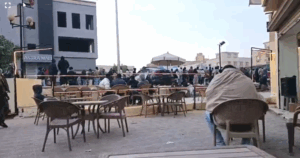ICC Prosecutor urges Council to arrest Al Bashir
“The pervading toxic culture of impunity must be tackled in order for justice to prevail in Darfur,” the International Criminal Court’s Prosecutor told the UN Security Council yesterday as it remained split on how the matter was being handled.
“The pervading toxic culture of impunity must be tackled in order for justice to prevail in Darfur,” the International Criminal Court’s Prosecutor told the UN Security Council yesterday. Council Member States remain split on how the matter is being handled.
Fatou Bensouda, presenting her twenty-fifth report on the situation in Darfur, pursuant to Council Resolution 1593 (2005), urged the 15-member Council to take concrete action and help deliver justice to the victims of the crimes committed in Darfur.
She stressed the need for action in the arrest and surrender of suspects wanted by the Court. President of Sudan Omar Al Bashir, for whom an arrest warrant had been issued by the ICC in 2009, travelled to South Africa and more recently to Jordan. “Let us not forget, these men stand accused of multiple charges for some of the world’s most serious crimes as foreseen under the Rome Statute,” the prosecutor said.
Darfur was not out of the clear, Prosecutor Bensouda continued, expressing concern over recent developments on the ground. Those included: renewed clashes between the Sudanese army and armed opposition movements; attacks and gender-based violence aimed at displaced persons; and a worrisome spike in arrests of political opponents of Sudan’s government.
Non-compliance
The Council had the power to influence both State and non-State parties to the Rome Statute in order to assist efforts to arrest and surrender the Darfur suspects, Bensouda said. She noted that a Pre-Trial Chamber of the Court would soon decide whether South Africa acted in non-compliance with the Rome Statute, and the Council has to take concrete action in response to decisions of non-compliance.
Representative of Sudan, Omer Dahab Fadl Mohamed, said there had been no consensus on the decision to refer the situation in Darfur to the Court. The Court Prosecutor had continued to use offensive language against the President of Sudan and against the Security Council, including “the failure” of the Council or the “loss of its credibility”.
Statements
The Ethiopian representative Tekeda Alemu commented that the African Union had repeatedly urged the Council to withdraw its referral of the situation to the Court. Amr Abdellatif Aboulatta from Egypt added that the Court must be careful not to jeopardize peace and security on the African continent.
Russian representative Evgeny Zagaynov said he welcomed steps by the Government of Sudan to facilitate the delivery of humanitarian aid. Regarding the Security Council, it had been called on again by the prosecutor “to follow up on matters not appropriate to its work. If there was no unity among States on how they must execute the arrest of certain people then that must be discussed within the context of the Rome Statute.”
Representing the United States, Michele Sison said that bilateral engagement had identified ways to achieve tangible improvements, with the Government of Sudan committing to a unilateral cessation of hostilities. “Still, the victims and perpetrators must not be forgotten and justice must be served.”
Twenty-fifth report of the Prosecutor of the International Criminal Court











 and then
and then